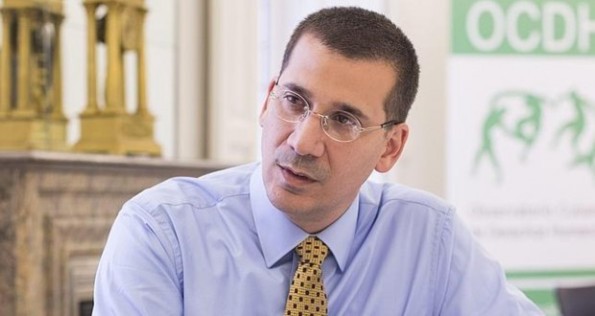 Far from being an association of think tanks or elite academics, Estado de SATS (State of SATS) is a project which brings together the various political and civic points of view to be found within the tiny illegal world of Cuban dissidents.
Far from being an association of think tanks or elite academics, Estado de SATS (State of SATS) is a project which brings together the various political and civic points of view to be found within the tiny illegal world of Cuban dissidents.
At one of their gatherings a highly regarded opposition figure like Manuel Cuesta Morúa might offer a talk on racial issues, a panel of independent attorneys might discuss legal matters with the audience, or a rapper named Raudel might give an hour-and-a-half long concert.
Estado de SATS often serves as a point of cultural, social, political and even sports contact for Cuba’s opposition. The physicist and mathematician Antonio Enrique González-Rodiles Fernández (born 1972 in Havana) is its most visible face.
His home in Havana’s Miramar district, with its spectacular view of the Atlantic Ocean, serves as the headquarters for Estado de SATS activities. Once an event is announced, the security services begin mobilizing.
A surveillance camera has been placed very indiscreetly along one side of the house. Suzuki motorcycles — the sturdy type used by counter-intelligence agents — prowl the surrounding area. And not infrequently one or two dissidents are detained. Harassment has become part of the landscape.
On the evening of Thursday, October 11, Rodiles was screening El Súper, a classic 1978 Cuban exile film by Orlando Jiménez Leal and León Ichaso. It tells the story of a family which has recently arrived in New York from the Caribbean.
Antonio Rodiles is perhaps Cuba’s most promising dissident by virtue of his extensive education as well as his formal manner of speaking and interacting with people. Dressed in a short-sleeve Prussian blue shirt and black slacks, and amid the din of houseguests and audio equipment, Rodiles spoke with me.
“The repression and harassment of Estado de SATS is cyclical,” he tells me. He mentions the detention of the former political prisoner José Díaz Silva and his wife, who is a member of the Ladies in White. Both were collecting signatures for Citizens’ Demand For Another Cuba. On the following day a Miami-based newspaper, Diario de Cuba, reported the couple had been released.
Demand For Another Cuba was launched in Havana in 2012. Among other things the petition publicly calls for a debate on the country’s dual currency system, the right of workers to a living wage, the right of all Cubans — no matter where they live — to launch financial projects in their own country and free [open] access to the internet.
Demand For Another Cuba also calls upon the regime to the ratify the United Nations’ Convention on Civil and Political Rights and the Convention on Economic, Social and Cultural Rights, which were signed by Cuba on February 28, 2008 in New York.
Rodiles is not optimistic. “I don’t believe the will is there to ratify them. It was a tactic meant to make a good impression in the eyes of the world. Remember that in 2008, when Barack Obama became president of the United States, the government of Raul Castro was trying to take on a reformist profile.”
Estado de SATS began operations in the summer of 2010. In the past three years arbitrary arrests and harassment by State Security have become routine. Last year Rodiles himself was detained for nineteen days in a foul-smelling jail cell in Havana’s Tenth of October district.
“We have gone through some bad times,” he says. “There are cycles. It’s like a wave, with stages in which the level of repression is low and others when it spikes. It is a surgical kind of harassment. Repressing twenty opponents is not the same as having to repress ten thousand disgruntled people. Special services is trying to patch the wound before it occurs.”
A series of actions carried out by Estado de SATS in the private employment sector has raised alarms with some of those in charge of keeping tabs on them. Any attempts to build bridges with non-dissident groups often makes agents of the secret police very nervous.
Rodiles knows this. He is convinced of the necessity to build a more effective opposition movement within Cuba. Leaky pipes which waste fifty-eight percent of the country’s drinking water, the chaotic state of public transport, a low-quality educational system, and dilapidated hospitals affect Castro loyalists as well as opponents.
This is why Rodiles is trying to be more inclusive. “There are many ordinary Cubans among the 4,200 people who have signed the Demand For Another Cuba petition. Mismanagement by the state harms everyone, whatever that person’s ideology.”
I ask him how he sees himself in five years. Antonio Rodiles looks at the intense blue sea, which he can almost touch with his hand and answers, “I like politics. Economics too. It’s not that I am capable of giving up everything for politics, but I believe it is one path.”
Iván García
Photo: From “Cubans Are Losing Their Fear,” and interview published in ABC on September 20, 2013.
Further reading: The Opposition in Cuba: Calling Ourselves to Account
14 November 2013
